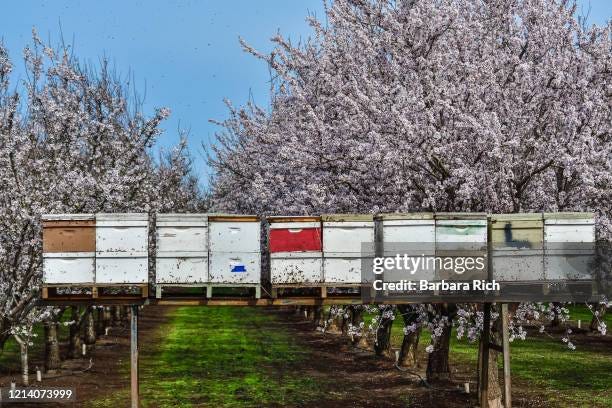Anybody who keeps or cares for bees would have been appalled by the news.
Online news sites reported that an articulated truck (known in America as a “semi” or a “big rig”) had overturned releasing millions of bees. I had to read the story twice to take in all the details. I think my lips might have been moving.
The truck was on a narrow country road in the remote county of Whatcom in northern Washington State, close to the border with Canada. The driver appears to have misjudged a tight corner. The rear wheels of the trailer dropped into a ditch and the rig overturned. The load it was carrying tumbled off the side of the trailer, with much of it spilling in the road.
That load consisted of an enormous number of hives, full of honey bees. It hasn’t been possible to find a precise number but reports said that the total weight of the load was 70,000 pounds or 31751 kilos. If you say that the average weight of a fully-occupied hive might be 50kgs you’re looking at a total load on the lorry of about 650 hives. That’s one hell of a lot of hives. And bees.
Not so many, perhaps, as was first reported. Whenever a story breaks in the popular media that involves escaped bees they always go totally doolally with reports of “killer swarms” but on this occasion they magnificently outdid themselves. “250 million honeybees took to the skies”, thundered Huffpost, my original source for the story.
Er, not quite. If there were 650 hives and each contained about 35000 bees the total number might have been about 23 million bees. Later reports spoke of 14 million. That’s probably closer to the truth.
Even so, anybody with a properly grounded sense of proportion would ask “Why would anybody be transporting that many bees as a cargo on the back of a truck?”
Up there close to the Canadian border, a more common sight would be a big rig hauling massive lengths of steel or timber.
In this instance, however, we are looking at a regular phenomenon in American life. This accident is a symptom of the commodification of animals and the exploitation of the natural world by an agricultural industry whose methods might conceivably reduce that continent to a desert.
That explains why, within moments of reading the report, I was boiling with rage.
The transportation by road of tens of millions of bees across America is a routine, annual event. It is most famously associated with the blooming of the almond harvest in California which is part of a staggeringly colossal, multi-billion dollar industry.
That industry is entirely dependent on bees.
Almond orchards cover 1.4 million acres of the state, producing 1.3 million metric tonnes of almonds every year. That’s 80% of the world’s supply.
From January to March, those trees bloom with countless trillions of delicate pink and white flowers that, like the heather on Scottish hillsides, provide one of California’s most beautiful natural attractions. A tourist trail takes in the sights from Fresno to Sacramento.
Every one of those flowers needs to be pollinated to meet the demands of the almond producers. To that end, they import as many as 2.8 million honey bee colonies into the state, most of which will be trucked in from all over the country and worked to death like hens in a battery chicken warehouse. That adds up to about 170,000,000,000 bees.
When the almond bloom is over, the surviving colonies are trucked away to serve other industrial cultivations such as apple orchards, cherry farms and blueberry fields. We don’t know where the truck that crashed in Whatcom County was headed nor where it had come from but it’s possible it might have been on its way north from California to honey extractors in Canada.
I’m just guessing there but what is certain is that the bees enslaved in this way are being subjected a process that manifestly does them a whole lot of no good.
Studies have shown that they routinely suffer stress-related disorders. These include increased aggression; the development of respiratory and parasitic infections; and the ingestion of bacterial toxins which can result in paralysis and death.
Keeping bees in these conditions and subjecting them to these trans-continental ordeals seems as odious and reprehensible as – for example – the abominable practices of the pig industry in America, where an individual pork plant can “process” as many as 30,000 animals a day, over 10 million a year.
Surely there will be consequences? Isn’t it obvious that there must be trouble? Just as the ruthless exploitation of animals has previously led to the spread of salmonella in eggs and BSE in beef, so we may be reasonably sure that the intensive abuse of bees in America will lead to some form of disaster for the bee population as a whole.
Last winter, for example, 60% of all managed bee colonies across the USA died off – one of the worst such events in recorded history. It wouldn’t take many more episodes like that to wipe out the almond industry. No bees=no trees=no profits. Nearly half of California was classified as desert before irrigation made possible the growth of the fruit and nuts businesses in the early 20th century. It may be going back that way.
We don’t yet know why last year’s mass die-off occurred but I would suggest the picture of that truck with its wheels in the ditch in Whatcom County gives us a clue.
What it tells us, in my view, is, “This is no way for human beings to treat wild animals.”





Email from a friend:
I was once in California to write about the pollination of the almond trees by the bees. You're quite right. This is a massive industry (conducted mostly by descendants of farmers brought from Japan for their expertise). Each day, two or three bees would come out of their hives, circle unhappily for a few minutes, and then go straight back in again. It wasn't quite warm enough, and when it's not warm enough, bees won't work. So the entire industry stood on hold, waiting for a bee to feel warm. One of the farmers, watching this, rushed over and gave the hive a vicious kick. "One day, I'm going to invent the mechanical bee, and you little bastards will all be out of work, every goddam one of you."
… and what hope is there of the current trumped up ‘government’ being in the least bit concerned?
I was aware of a similar process in the avocado monoculture. We will never stop exploiting our host planet, but a bit of a long term view would be helpful… I am dreaming.